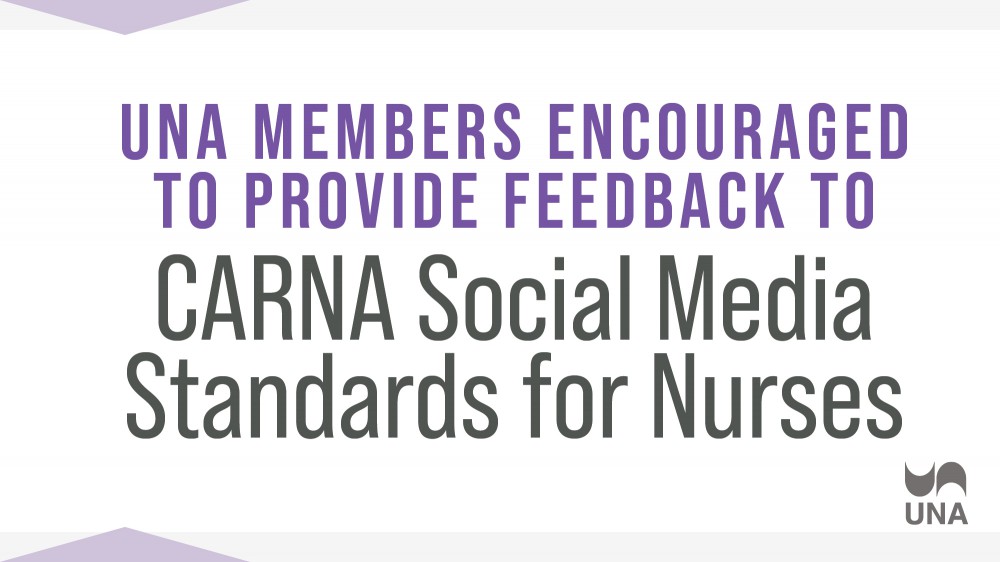UNA members encouraged to provide feedback to CARNA Social Media Standards for Nurses
United Nurses of Alberta has prepared a response to the CARNA draft Social Media Standards for Nurses document and encourages its members to read the draft document and respond with their feedback by Oct. 25, 2020.
Here is the feedback and explanation provided by UNA through the CARNA online feedback form:
1. Do the draft standards clearly outline your professional and ethical obligation to protect the public with online conduct and social media use in a professional role as a nurse?
A: No. Many of the draft standards are in conflict with foundational practice standards and the CNA Code of Ethics and cause confusion as to what role nurses ought to play in public discourse. As well, some terms within the standards such as “online care," for example, are poorly defined or not defined at all leading to lack of clarity as to what is meant by these terms.
2. Do the draft standards clearly articulate your responsibility to use professional judgment and informed decision-making with online conduct and social media use in your personal life?
A: No. The shift from the current guidelines toward such strong and uncompromising standards is an intrusive overreach into the personal lives of nurses. These standards seek to apply retroactively to social media presence prior to the standard coming into effect which is an inappropriate overreach.
3. Do the draft standards clearly outline your expectations in protecting the public’s trust in the profession and your reputation as a professional during online conduct and social media use?
A: No. Many of the social media standards conflict with foundational practice standard indicators and the CNA Code of Ethics that require nurses to question the status quo, and be an advocate for the best possible patient care. Therefore the social media standards have a strong potential to place a chill on the willingness of nurses to lend their knowledge and experience to be advocates within public discourse on policies surrounding health and the socioeconomic determinants of health which is not in the public interest.
4. Do the draft standards clearly outline expectations in protection of confidentiality and privacy of client health information during online care and social media use?
A: No. The term “online care” is not defined and is ambiguous. Standards around confidentiality and privacy of health information are already adequately addressed by existing foundational practice standards.
5. Do the draft standards clearly outline expectations regarding therapeutic and professional boundaries with clients when conducting online care?
A: No. “Online care” is not defined. Social media standards surrounding privacy settings and “friending” and “following” are an overreach into nurses’ personal lives, are unrealistic and too prescriptive. Existing practice standards adequately convey expectations regarding therapeutic and professional boundaries.
6. Do the draft standards clearly outline expectations of advertising health services online?
UNA has no opinion on this standard
7. Do you have other comments or feedback you wish to provide?
A: Yes. The draft social media standards conflict with the right of nurses to freedom of expression, a right that was recently affirmed by the courts in the Strom decision. As per this decision, criticism of the health care system by frontline workers is in the public interest and should not be unreasonably restricted as these draft standards attempt to do. Any social media standards must take into account the implications of this court decision.
Also, the entirety of the social media standards are redundant given that existing foundational practice standards and existing social media guidelines already adequately convey the expectations of nurses and can be used to address instances of unprofessional social media conduct.

